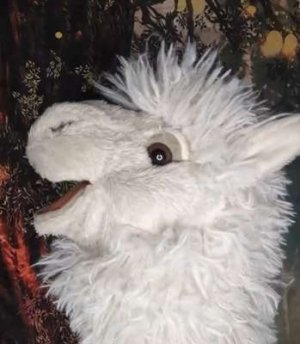Discover the bizarre lifestyle of people who act like animals and their heartfelt plea
By
Danielle F.
- Replies 1
In a world where individuality and personal identity are increasingly celebrated, a unique subculture has emerged that challenges the very boundaries of what it means to be human. This group, known as 'therians' or 'furries', has captured the public's imagination and sparked both curiosity and controversy. They are individuals who identify deeply with animals, not just in spirit or as a playful hobby, but as a core part of their being. Some eat from bowls, use litter trays, and even walk on all fours, embracing an animalistic lifestyle that defies conventional norms.
At the Seniors Discount Club, we've seen our fair share of trends come and go, but this one truly stands out. It's not every day that you hear about someone who identifies as a llama or a person who spends their days living as a domesticated pet. Yet, these are real stories from real people who are seeking understanding and respect for their chosen identities.
Take, for example, the American TikToker who has gained a following by sharing her life as a self-identified llama. Her account, punk.rock.llama, is a blend of comedy and self-expression, where she uses animal puppets to convey her message. She's not alone in her journey; across the globe, thousands of young people gather online to share their experiences as 'therians' and seek advice on how to navigate a world that often misunderstands them.
The term 'therian' refers to those who feel an innate connection to a particular animal, believing they share characteristics or even a spiritual link with their chosen creature. This is distinct from 'furries', who typically see their animal personas as characters or alter egos, sometimes with a sexual element. Therians, on the other hand, experience their animal identity as an intrinsic part of themselves.
This phenomenon isn't limited to the fringes of the internet. Schools in the UK have reported instances of children with 'species dysphoria' who wish to be recognised as animals among their peers. And in a move towards inclusivity, US singer Dorian Electra made headlines by adding litter trays to public toilets at their concert venues.
The therian community is diverse, with members identifying as domestic animals like cats and dogs, as well as wild creatures such as wolves and foxes. Some even believe they are extinct species, a subgroup known as 'paleotherians'. They often wear masks and tails to express their identities and claim to feel a profound connection to nature.
While many find solace and joy in their therian identities, the lifestyle can lead to challenges in daily life and relationships. For instance, a Channel 4 documentary explored the secret world of 'human pups' in the UK, revealing individuals who fully embrace the life of a canine, complete with handlers and puppy play. The documentary highlighted the escapism and sense of freedom that participants find in their animal personas.
As seniors, we've seen society evolve in countless ways, and the rise of the therian community is yet another example of this ongoing transformation. It's a reminder that the quest for identity and acceptance is a universal one, transcending age and background.
While some may view the therian lifestyle with scepticism or even disdain, it's important to approach these stories with an open mind. After all, the essence of dignity lies in respecting the individual choices of others, even when those choices seem unconventional. As the health minister insists, everyone deserves dignity, and that includes those who find their truest selves in the spirit of an animal.

So, let's engage in a conversation about this intriguing subculture. Have you ever encountered someone who identifies as a therian or furry? What are your thoughts on this unique expression of identity? Share your experiences and perspectives with us in the comments below.
At the Seniors Discount Club, we've seen our fair share of trends come and go, but this one truly stands out. It's not every day that you hear about someone who identifies as a llama or a person who spends their days living as a domesticated pet. Yet, these are real stories from real people who are seeking understanding and respect for their chosen identities.
Take, for example, the American TikToker who has gained a following by sharing her life as a self-identified llama. Her account, punk.rock.llama, is a blend of comedy and self-expression, where she uses animal puppets to convey her message. She's not alone in her journey; across the globe, thousands of young people gather online to share their experiences as 'therians' and seek advice on how to navigate a world that often misunderstands them.
The term 'therian' refers to those who feel an innate connection to a particular animal, believing they share characteristics or even a spiritual link with their chosen creature. This is distinct from 'furries', who typically see their animal personas as characters or alter egos, sometimes with a sexual element. Therians, on the other hand, experience their animal identity as an intrinsic part of themselves.
This phenomenon isn't limited to the fringes of the internet. Schools in the UK have reported instances of children with 'species dysphoria' who wish to be recognised as animals among their peers. And in a move towards inclusivity, US singer Dorian Electra made headlines by adding litter trays to public toilets at their concert venues.
The therian community is diverse, with members identifying as domestic animals like cats and dogs, as well as wild creatures such as wolves and foxes. Some even believe they are extinct species, a subgroup known as 'paleotherians'. They often wear masks and tails to express their identities and claim to feel a profound connection to nature.
While many find solace and joy in their therian identities, the lifestyle can lead to challenges in daily life and relationships. For instance, a Channel 4 documentary explored the secret world of 'human pups' in the UK, revealing individuals who fully embrace the life of a canine, complete with handlers and puppy play. The documentary highlighted the escapism and sense of freedom that participants find in their animal personas.
As seniors, we've seen society evolve in countless ways, and the rise of the therian community is yet another example of this ongoing transformation. It's a reminder that the quest for identity and acceptance is a universal one, transcending age and background.
While some may view the therian lifestyle with scepticism or even disdain, it's important to approach these stories with an open mind. After all, the essence of dignity lies in respecting the individual choices of others, even when those choices seem unconventional. As the health minister insists, everyone deserves dignity, and that includes those who find their truest selves in the spirit of an animal.
Key Takeaways
- An American TikToker has shared that she identifies as a llama, highlighting a growing community of 'therians' and 'furries' who adopt animal characteristics and behaviours.
- The therian community differentiates themselves from furries, with therians believing they are non-human animals on a deep level, while furries see their animal personas as characters, sometimes with a sexual element.
- Some individuals take their animal identities into their daily lives, using litter trays, walking on all fours, and wearing animal masks, while a health minister has emphasised they deserve dignity.
- The trend has brought about mixed reactions, from accommodation such as adding litter trays in public toilets for inclusivity, to concerns raised by schools and parents about the implications of children identifying as animals.








